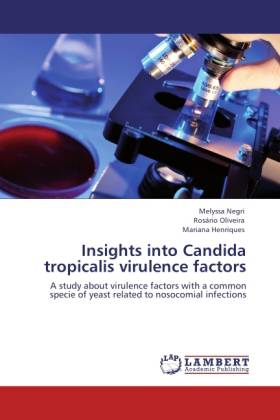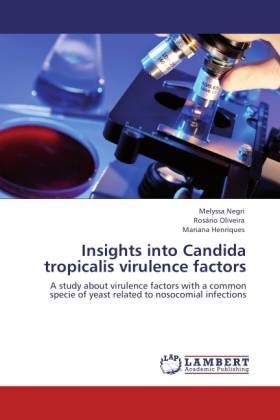
Bedankt voor het vertrouwen het afgelopen jaar! Om jou te bedanken bieden we GRATIS verzending (in België) aan op alles gedurende de hele maand januari.
- Afhalen na 1 uur in een winkel met voorraad
- In januari gratis thuislevering in België
- Ruim aanbod met 7 miljoen producten
Bedankt voor het vertrouwen het afgelopen jaar! Om jou te bedanken bieden we GRATIS verzending (in België) aan op alles gedurende de hele maand januari.
- Afhalen na 1 uur in een winkel met voorraad
- In januari gratis thuislevering in België
- Ruim aanbod met 7 miljoen producten
Zoeken
Insights into Candida tropicalis virulence factors
A study about virulence factors with a common specie of yeast related to nosocomial infections
Melyssa Negri, Rosário Oliveira, Mariana Henriques
Paperback | Engels
€ 78,45
+ 156 punten
Omschrijving
Candida tropicalis is a common species related to nosocomial infections, namely candidemia and candiduria. Several virulence factors seem to be responsible for C. tropicalis infections, which present high potential for dissemination and mortality. Adhesion to surfaces (medical devices and host cells) and biofilm formation, are considered important factors that contribute to the development of candidosis. Further, adhesion and invasion of host cells by C. tropicalis is considered the first step to initiate systemic infections. Once adhered to epithelium, C. tropicalis are able to secrete hydrolytic enzymes that cause damage in host cells membrane integrity, leading to dysfunction or disruption of host structures. Thus, the main aim of this work was to characterize the virulence factors of C. tropicalis as well as to evaluate adhesion to biotic and abiotic surfaces, biofilm formation, expression of hydrolytic enzymes and antifungal susceptibility of C. tropicalis clinical isolates from urine and blood cultures and from central venous catheters.
Specificaties
Betrokkenen
- Auteur(s):
- Uitgeverij:
Inhoud
- Aantal bladzijden:
- 144
- Taal:
- Engels
Eigenschappen
- Productcode (EAN):
- 9783846596005
- Verschijningsdatum:
- 5/12/2011
- Uitvoering:
- Paperback
- Afmetingen:
- 150 mm x 220 mm
- Gewicht:
- 208 g

Alleen bij Standaard Boekhandel
+ 156 punten op je klantenkaart van Standaard Boekhandel
Beoordelingen
We publiceren alleen reviews die voldoen aan de voorwaarden voor reviews. Bekijk onze voorwaarden voor reviews.









